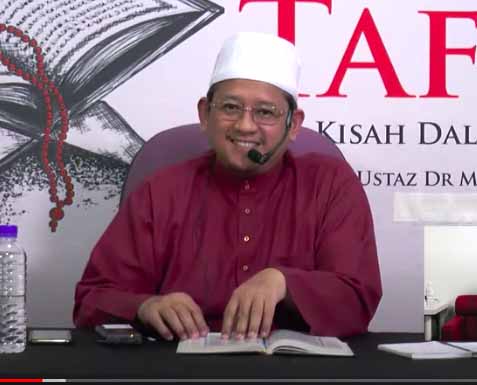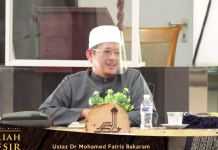This article is a summary of takeaways from Ustaz Dr Mohamed Fatris Bakaram’s Tafsir Lecture at Darul Makmur Mosque on 5th April 2020. Summaries of previous lectures on Surah Taha can be found here. This lecture is a continuation of last week’s lecture of Surah Taha verses 77 to 86.
Brief Recap
In the previous lesson, we learnt from Surah Taha verses 77 to 86 about Prophet Musa AS’ journey with Bani Israel. After the defeat of Firaun in the splitting of the Red Sea, Bani Israel travelled with Prophet Musa towards their homeland. Along the way, Prophet Musa AS left the people for a period of 40 days to meet with Allah SWT on Mount Tur. On the mountain, Prophet Musa received the news that a formidable test had come unto his people through As-Samiriy in Prophet Musa’s absence. Prophet Musa immediately returned to his people after his appointed time at the mountain. He was angry, disappointed and disheartened by his people’s attitude. We will now see what happens next.
Bani Israel’s Response
قَالُوا مَا أَخْلَفْنَا مَوْعِدَكَ بِمَلْكِنَا وَلَٰكِنَّا حُمِّلْنَا أَوْزَارًا مِّن زِينَةِ الْقَوْمِ فَقَذَفْنَاهَا فَكَذَٰلِكَ أَلْقَى السَّامِرِيُّ
They said, “We did not break our promise to you of our own accord, but we were burdened with loads from the ornaments of the people; So we threw them, and thus did As-Samiriy cast.” [20:87]
The people of Bani Israel responded to Prophet Musa AS saying that they did not have a choice but to break their promise. As servants to the people of Egypt, many of them had been tasked to take care of the valuable jewellery belonging to their masters – much of it made of gold. For whatever the reason may be, many of them brought this jewellery along with them during their exodus from Egypt. Bani Israel claimed that this additional load had started to become too heavy for them to carry. Following Samiriy’s recommendation, they had tossed out the gold.
The Origins of the Golden Calf
This verse was further elaborated upon by Tafsir Scholars. Tafsir studies indicate that in Prophet Musa AS’ absence, Samiriy had addressed his people. He claimed that the reason why Bani Israel was going through trial after trial (i.e. having to travel seemingly endlessly and having to wait for Prophet Musa who didn’t seem to be coming back), was because of the jewellery that they were carrying that did not belong to them. As-Samiriy claimed that the only way to relieve the people of this misfortune was to dispose of the gold. He had then dug a deep pit, lit a fire and setting an example for everyone else, asked Bani Israel to toss their gold into it.
فَأَخْرَجَ لَهُمْ عِجْلًا جَسَدًا لَّهُ خُوَارٌ فَقَالُوا هَٰذَا إِلَٰهُكُمْ وَإِلَٰهُ مُوسَىٰ فَنَسِيَ
Then he brought forth for them (a statue of) a calf, which had a figure and a lowing sound. Then they said, “This is your god and the god of Musa, but he forgot.” [20:88]
We do not know how exactly this happened, but As-Samiriy moulded a calf idol out of the molten gold in such a way that it managed to produce a sound. Hearing the sound come out of the statue, the people were stunned. The people of Bani Israel – not just As-Samiriy – claimed that this idol was the true god and that Prophet Musa AS had forgotten his God.
Be Wary of the Illusions of this World
This is a reminder to us as Muslims to not repeat the mistakes of Bani Israel. Do not easily get fascinated, deceived or influenced seeing the strange things that people are able to do in front of our eyes. This is a weakness of human beings. May Allah grant us, as believers, firm protection against misguidance. Allah has granted us minds that think. At times, what we see with our eyes are mere illusions, mirages of the world, meant to distract us. The hearts of believers are not blind. We have a consciousness that drives the heart to safety in this world and the next.
أَفَلَا يَرَوْنَ أَلَّا يَرْجِعُ إِلَيْهِمْ قَوْلًا وَلَا يَمْلِكُ لَهُمْ ضَرًّا وَلَا نَفْعًا
Did they not see that it could not return to them any speech and that it did not possess for them any harm or benefit? [20:89]
Prophet Musa questioned Bani Israel’s logic, asking them if the absurdity of their belief was not apparent. The statue could merely make a sound, it was unable to hold a conversation or cause any harm or bring any benefit. Yet the people were convinced of it being ‘God’ and worshipping it.
Prophet Musa’s Response to His Brother, Harun
وَلَقَدْ قَالَ لَهُمْ هَارُونُ مِن قَبْلُ يَا قَوْمِ إِنَّمَا فُتِنتُم بِهِ ۖ وَإِنَّ رَبَّكُمُ الرَّحْمَٰنُ فَاتَّبِعُونِي وَأَطِيعُوا أَمْرِي
And Harun had indeed earlier said to them, “O my people, surely you have been fooled (by As-Samiriy); and surely your Lord is The All-Merciful; so closely follow me, and obey my command.” [20:90]
Prophet Harun AS had tried to no avail to guide the people back to the truth. He had invoked the name of Ar-Rahman in order to remind Bani Israel of Allah SWT’s Mercy and Compassion that had brought them to where they stood on that day. Prophet Harun had tried to call them back to return to the right path by following his guidance.
قَالُوا لَن نَّبْرَحَ عَلَيْهِ عَاكِفِينَ حَتَّىٰ يَرْجِعَ إِلَيْنَا مُوسَىٰ
They replied, “We will not cease to worship it until Moses returns to us.” [20:91]
قَالَ يَا هَارُونُ مَا مَنَعَكَ إِذْ رَأَيْتَهُمْ ضَلُّوا
(Musa) said: “O Harun! What stopped you when you saw them going astray… [20:92]
أَلَّا تَتَّبِعَنِ ۖ أَفَعَصَيْتَ أَمْرِي
… From following me? Have you then disobeyed my order?” [20:93]
Prophet Musa AS was angry. Tafsir scholars have described him in their books as being someone who was not only firm and fierce, but also short-tempered. As a prophet, even though he got angry easily, he was also quick to recognise his mistakes and would calm down immediately once a gentle reminder was given to him AS.
قَالَ يَا ابْنَ أُمَّ لَا تَأْخُذْ بِلِحْيَتِي وَلَا بِرَأْسِي ۖ إِنِّي خَشِيتُ أَن تَقُولَ فَرَّقْتَ بَيْنَ بَنِي إِسْرَائِيلَ وَلَمْ تَرْقُبْ قَوْلِي
(Harun) said, “O son of my mother, do not hold me by my beard, nor by my head. I feared that you would say, ‘You have caused discord among the children of Israel and did not observe my advice.’” [20:94]
Prophet Harun responded to Prophet Musa AS’ rage with calmness and gentleness, reminding him that he was his brother. He then explained that the reason why he had not acted harshly towards Bani Israel was firstly, to avoid causing discord between those who worshipped and did not worship the cow. Secondly, he did not want to undermine Prophet Musa AS’ authority by disobeying him. Prophet Harun AS had taken all of the actions that were feasible for him. Seeing the obstinacy of the people, he was unable to do more besides await Prophet Musa’s return. He did not want to take any actions which might later on result in conflict between him and his brother.
Samiriy’s Defence
قَالَ فَمَا خَطْبُكَ يَا سَامِرِيُّ
Musa said, ‘And what was the matter with you, O Samiriy?’ [20:95]
قَالَ بَصُرْتُ بِمَا لَمْ يَبْصُرُوا بِهِ فَقَبَضْتُ قَبْضَةً مِّنْ أَثَرِ الرَّسُولِ فَنَبَذْتُهَا وَكَذَٰلِكَ سَوَّلَتْ لِي نَفْسِي
He replied, ‘I saw something they did not; So, I picked up a handful from under the footstep of the messenger. Then, I cast it. And thus, my inner-self tempted me.” [20:96]
When questioned about his actions, Samiriy reported that he had seen something that wasn’t apparent to anyone else. During the splitting of the Red Sea, Samiriy claimed that he had seen an angel who had come down to aid Prophet Musa and Bani Israel. Samiriy stated that he had collected a handful of sand from the spot on which he saw the angel had stood. He then claimed to have tossed this sand into the fire along with the gold, making the material that was used to shape the calf idol. Seeing the response of the people towards the calf idol, Samiriy confessed having fallen to the temptation of his desires.
There is some discussion amongst tafsir scholars regarding whether or not there was indeed “magic” in the sand that was collected from the “footstep of an angel”. In my opinion, all that was being said were mere claims from Samiriy. Samiriy was a normal man just like anyone else; He wasn’t a Waliy of Allah or a scholar in anyway. If he had been, he would not have misled people towards worshipping an idol. Someone who is able to lead people astray has to have kufr (disbelief) in his heart. Personally, I find his story questionable and I do not think that we should pay so much attention into the deeper content of this verse; These were mere empty excuses or lies made by Samiriy to save himself.
Samiriy’s Punishment
قَالَ فَاذْهَبْ فَإِنَّ لَكَ فِي الْحَيَاةِ أَن تَقُولَ لَا مِسَاسَ ۖ
(Musa) said, “Then go away; It is destined for you that, throughout your life, you will say: ‘Do not touch me’. [20:97]
Samiriy was given a punishment by Allah such that wherever he went, he would be deserted and distanced from people. Samiriy would be unable to say anything to others except to tell them to go away.
Some tafsir resources say that Samiriy was punished with a curse such than anyone who comes into contact with him will become infected with a disease. This claim however is not supported by a credible (sahih) source.
وَإِنَّ لَكَ مَوْعِدًا لَّن تُخْلَفَهُۖ
And indeed, you have an appointment [in the Hereafter] you will not fail to keep… [20:97]
A guarantee was made to Samiriy that his punishment will be paid not only in this world, but also in the Hereafter.
The End of the Calf Idol
وَانظُرْ إِلَىٰ إِلَٰهِكَ الَّذِي ظَلْتَ عَلَيْهِ عَاكِفًا ۖ لَّنُحَرِّقَنَّهُ ثُمَّ لَنَنسِفَنَّهُ فِي الْيَمِّ نَسْفًا
… And look at your “god” to which you stayed devoted. We will certainly burn it, then we will scatter it thoroughly in the sea. [20:97]
The attention was then brought to the calf idol. Even though the idol was made of valuable gold, Prophet Musa did not melt it and shape it into something else. To him, this gold was now of no value because of the heinous act it was used for. Instead of recycling it, Prophet Musa AS ensured that all traces of it were disposed off such that there was no way in which anyone from Bani Israel could continue to worship the idol in any physical form.
إِنَّمَا إِلَٰهُكُمُ اللَّهُ الَّذِي لَا إِلَٰهَ إِلَّا هُوَ ۚ وَسِعَ كُلَّ شَيْءٍ عِلْمًا
Your God is Allah other than whom there is no god. He encompasses everything with knowledge.” [20:98]
Prophet Musa AS gave another reminder to Bani Israel, that Allah is the sole entity worthy of worship. Allah SWT has full knowledge of all that happens in the heavens and the Earth. He SWT was aware of the actions of Bani Israel. He SWT knew about Samiriy’s true intent. He SWT sees and knows all that we do. Whatever we hide from the people, whatever truth lies behind the excuses we make, Allah knows all of it.
Final Comments Regarding Bani Israel
The story of Prophet Musa AS in Surah Taha ends here. In Surah Al-A’raf, the story continues as Prophet Musa persists on his journey with Bani Israel to their homeland. We hear about Bani Israel going through trial after trial with heedlessness and disobedience. They do not commit only minor mistakes, rather they make grave errors including worshipping a false god and outrightly disobeying Prophet Musa’s words.
Let us recap once more the history of Bani Israel. Bani Israel started from the children of Prophet Yaqub (also known as Israel). Prophet Yaqub’s son, Prophet Yusuf AS, was abandoned by his brothers in a well and sold off to the ruler of Egypt as a servant. He eventually became a governor in Egypt, bringing his family to settle in with him as an honoured community amongst the Egyptians. Bani Israel (the children of Israel) gradually lost their status and freedom in the community, before eventually becoming slaves under the rule of Firaun.
However, Bani Israel was not left in disgrace. As we have seen in this Surah, they were saved from oppression when Prophet Musa AS was sent to defeat Firaun and free his people. The fate of Bani Israel was shifted: from being captive slaves to free men, from being poor and destitute to being able to own and produce wealth, from being disgraced to having their own land and property to thrive on. Allah SWT was the one who provided the way out of misery and into comfort.
Despite the blessings that Allah SWT had showered upon them, their status with Allah did not rise. Throughout their time with Prophet Musa AS, we see incident after incident occur in which they earned Allah’s wrath and punishment. This can be seen in verse 112 of Surah Ali-Imran in which Allah SWT says:
ضُرِبَتْ عَلَيْهِمُ الذِّلَّةُ أَيْنَ مَا ثُقِفُوا إِلَّا بِحَبْلٍ مِّنَ اللَّهِ وَحَبْلٍ مِّنَ النَّاسِ
Disgrace has been put over them wherever they may be, unless they hold fast to “hablin minAllah” and “hablin minAn-Nas”. [3:112]
Bani Israel was only to be spared from humiliation if they took care of two things: (1) their relationship with Allah SWT and (2) their relationship with mankind. Bani Israel failed in these aspects. Their fates may have been shifted by Allah, however it did not mean anything because their status in Allah’s eyes remained the same.
Change What is Within Yourselves
What we can learn from this is that our fates may be changed by Allah, but it won’t make any difference to us, for as long as our attitude with Allah does not change. It won’t make a difference to us, if how we handle our relationship with Allah and with people around us does not change.
We see examples of people who live difficult lives in poverty. They strive and work hard in order to break out of hardship. We see how these people receive a “twist of fate”, from being poor and looked down upon to being wealthy and highly regarded. However, regardless of how much their situation has physically changed, if their attitude towards Allah does not change (i.e. if their gratitude is not shown, if their character is not beautified etc.) the change of fate in this world does not make a difference to them in the hereafter. These people often succumb to arrogance, rebelliousness and heedlessness. This is why we hear of stories like “Tanggang” in Malay folklore. We ask Allah to protect us from such misfortune as someone who receives perceived success in this world but fails in the hereafter in spite of it.
We need to aim not just for a shift in fate, but also a shift in attitude. We want to be in a position where, when Allah brings us out from a period of difficulty to a life of ease and comfort, our Iman (faith), Taqwa (God-consciousness) and relationship with Allah is further strengthened.
At this point of time, allow me to go through this well-known quote from Surah Ar-Ra’d, Verse 11:
إِنَّ اللَّهَ لَا يُغَيِّرُ مَا بِقَوْمٍ حَتَّىٰ يُغَيِّرُوا مَا بِأَنفُسِهِمْ
[13:11]
This verse is often translated as,
“Surely, Allah does not change the fate of a people unless they change their own fates.”
I find that this translation is not the most appropriate for this verse. The word “ma” that has been loosely translated to ‘fate’, is in fact a broad and general term meaning ‘what’ or ‘whatever’. In my opinion, this verse should be translated to:
“Verily Allah does not change what is with a people, until and unless they change what they have within themselves.”
We as the Malay community enjoy speaking about fate or ‘nasib’ all the time. This verse though, does not merely address fate. There is more to who we are than just our fate. What is within us will not shift until we shift it. Fate is one aspect of who we are. Rizq (sustenance) is another. In addition, our attitude, our actions, our efforts and even our habits all play a part in determining who we are. To live a life that is better than the one we have right now, we need to make a few changes for ourselves. We need to change our attitude, our temperament, our character, our efforts and our habits.
Where is the evidence to support what I am saying? Let’s have a look at Surah Al-Anfal, verse 53. This verse is a “twin”; What this means, in the study of tafsir, is that the interpretation of one verse of the Qur’an can be found in another.
ذَٰلِكَ بِأَنَّ اللَّهَ لَمْ يَكُ مُغَيِّرًا نِّعْمَةً أَنْعَمَهَا عَلَىٰ قَوْمٍ حَتَّىٰ يُغَيِّرُوا مَا بِأَنفُسِهِمْ ۙ وَأَنَّ اللَّهَ سَمِيعٌ عَلِيمٌ
[8:53]
This verse can be translated as:
“That is because Allah would not change a favour which He had bestowed upon a people until they change what is within themselves. And indeed, Allah is Hearing and Knowing.”
What this means is that Allah will not remove the blessings that He has given to us. Whatever good we get remains with us and will not disappear, unless we ourselves change those blessings into misfortunes. We do this by being ungrateful, heedless, disobedient, proud, stubborn etc.
If we read both the verse before and after verse 53 of Surah Al-Anfal, we will see that Allah mentions the habits of the followers of Firaun. Allah gave these people abundant blessings in terms of wealth, success, facilities, resources, power, intelligence etc. Egypt was amongst the earliest great civilisations in the world, with technology that is still studied until today. All of these blessings made no difference and did not last because they changed their blessings into misfortune due to what was in themselves.
The verse in Surah Ar-Ra’d on the other hand, speaks about the hypocrites of Makkah. The Quraysh were gifted with plentiful blessings since the time of Prophet Ibrahim AS. They had an unlimited freshwater source along with fame and wealth due to their prime location. They were an international centre for trade, living in prosperity and power. Such blessings made no difference to them. Rather it increased them in arrogance, pride, stubbornness and disbelief.
These are lessons for us to learn from. If our life situation right now is not ideal, then put in the effort to change it. Do not be lazy and sit in resignation, claiming that this is all fated and that you have no power to change anything. Whatever the difficulty you may be encountering right now, put in the effort, knowing that the outcome is still up to Allah. Have faith and trust in Allah’s power, but do not be lax in putting in the required effort. Most importantly, do not only change what is physically around you, focus on what you can change internally.
When the trials and difficulties end, will you return to your original state – being the same person you were before the tests happened? Start your preparations right now. Allah SWT is giving us an opportunity to have a look at our lives and see what changes we can make. What are your priorities in life? At the end of the day, when Allah changes our state of affairs, when he eliminates this painful pandemic, returning the world to its’ safe and comfortable condition, when all of this chaos ends… What will our attitude be like? What will our status be in Allah’s eyes?
Change your fate. But even more than that, change your internal state. Focus on your attitude, your Iman, your Taqwa and your relationship with Allah SWT. Do not wait until everything goes back to “normal” before you start thinking about what you can do to change. Let us emerge from this difficult period already being a changed person for the better.
May Allah unite us once again next week for the coming lesson. May He wipe away our sins, fulfil our needs, eliminate our worries and distance us from any suffering.
Ameen.
Summary by: Arina Adom
Arina Adom is a lover of learning who takes on the world with an open mind. Resourceful and adaptable, always ready to take on new challenges. Comfortable working with diverse groups of people, yet able to work independently. Thrives under pressure. Currently seeking a meaningful career that enables her to impact lives directly and bring about positive changes in the lives of others in the community.
Arina graduated with a degree in Science ( Hons ), Life Science from NUS. She is currently taking a diploma in Quran and Sunnah Studies from Al Zuhri.
Watch Kuliah Tafsir again at
MUSLIM SG Youtube
Watch and follow Kuliah Tafsir weekly
every Sunday after solat Maghrib
organised Masjid Darul Makmur & Muslim.SG.
Your contributions are appreciated.Get more details by clicking the image below.











